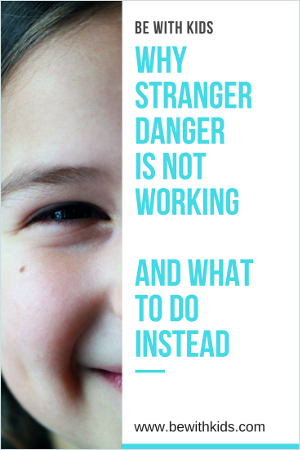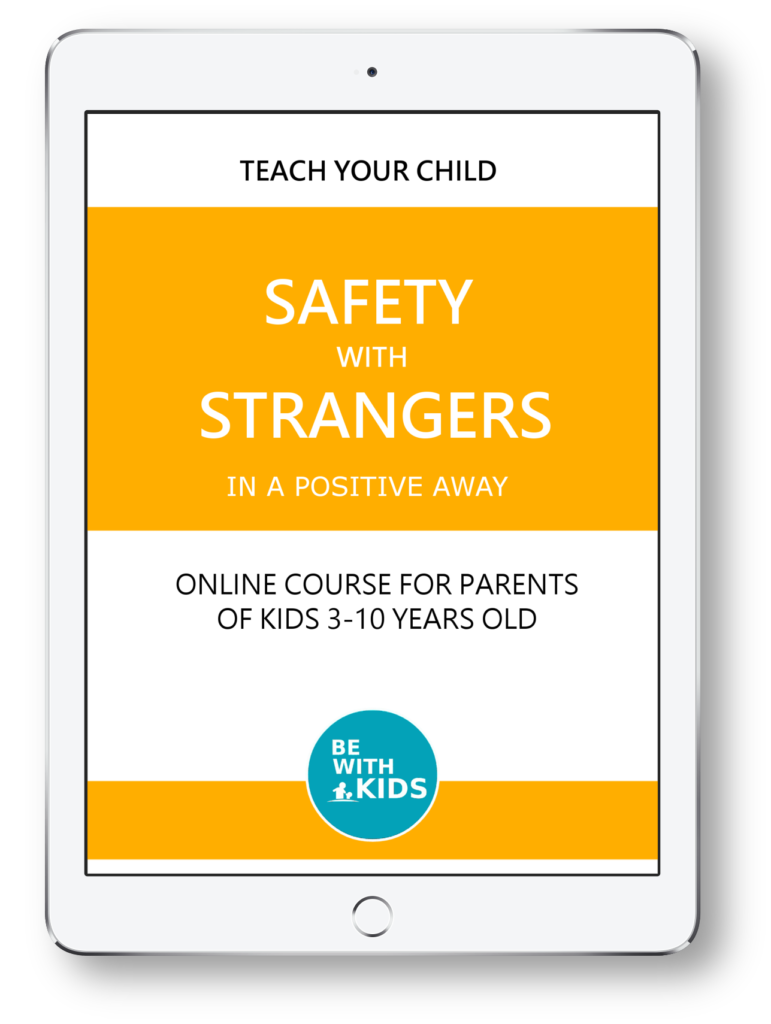Why “stranger danger” is not working and how to teach your child safety instead
Do you know why the concept of ‘stranger danger’ (or “tricky people”) is not working for teaching kids safety?
We were watching a cartoon that was supposed to teach safety to kids:
- “Who is this?” – my 4-year-old asked, pointing at the person hiding behind a tree and holding candy.
- “Eh… a bad guy?” – I suggested.
- "A stranger?" - he asked.
Uh-oh, we need to clear the concept of a stranger, I thought. That's how this conversation started.
“Don’t talk to strangers” is an old-school rule sending confusing messages to your child.
Keep in mind that most products for teaching kids safety are outdated.
Modern kids need a modern approach to safety.

Why most kids do not understand the concept of "stranger danger"
Your kids are confused when you tell them:
- "DO NOT talk to a stranger"
- "DO NOT leave with a stranger"
Because kids do not understand who the stranger is!
Is a stranger a man or a woman?
Old or young?
Good-looking or ugly?
Nice or mean?
How does your child see strangers:
- Is a waiter a stranger?
- What about the waiter you see regularly?
- Is a teacher a stranger?
- What about a volunteering parent taking kids to the restrooms during a camp?
- Is a friend of a dad a stranger too?
- But, is it safe to open the door to a dad's colleague who brought something while parents were at work? Is he a friend, or just (maybe) working at the same company?
Are you confused? Your child is confused!
What are the safety consequences?
! Unprepared child
may not recognize an unsafe stranger and
may not respond in a safe way.
Why do bad guys in the movies and cartoons offer candy to attract a child?
Because most kids’ safety resources are outdated.
In the past, cities were small, and strangers were odd.
A stranger in a village was a big deal.
But modern kids interact with strangers every day.
The outdated scenarios mislead kids
What is your child thinking?
- “Oh, a stranger is a mean, ugly person wearing a mafia-style hat and a black mask. He is enticing a child with a candy from behind a tree. No good”.
What does the child learn?
- “Watch out for the black-hats men offering candy!”
What is the conclusion your child makes?
- “But wait, I’ve got candy on Halloween, and nothing bad happened. Mom worries too much. I don’t think it’s dangerous”.
As a result:
- Your child is not considering strangers could be dangerous.
- He painted a wrong portrait of a stranger in his mind (white, middle-aged male in a particular environment and scenario).
The biggest safety problem with 3-8 year-olds
! Young kids understand the rules literally.
When you say:
- “Don’t take candy from strangers”
Your child depending on the age and safety level may act as:
- “It’s okay to go in with a neighbor to get some cookies”.
Because you didn’t specifically mention the neighbors and the cookies.
What your child needs to know to be safe with strangers (and other people around)
Kids need to know the big picture of how safety works.
They need to be able to keep themselves safe when you are not around.
They need to know how to handle safety situations you have never discussed.
Enroll in a Free online course for parents of kids 3-10 years old
"Teach Your Child Safety With People"
↓↓↓↓↓↓

Act, do not react.
↑↑↑↑↑↑↑
Take action
Great job so far - safety is a challenging subject!
Please sign up above to see the next steps.
↑↑↑↑↑↑↑
Do you want to know how safe is YOUR child?
You can test it!
What parents say:
"The questions of this test made me think of how many important topics my kids yet need to learn about safety.
Thank you for bringing it to my attention"
- Laura Richards, Mum of two

Can't find what you are looking for?
Please tell me what you are looking for and how I can help.
I'll be in touch.
Or try using the 



Hey there would you mind stating which blog platform you’re using?
I’m going to start my own blog in the near future but I’m
having a hard time choosing between BlogEngine/Wordpress/B2evolution and Drupal.
The reason I ask is because your design seems different then most blogs and I’m looking for
something completely unique. P.S Sorry for getting off-topic but I
had to ask!
Hi, not a problem: this is WordPress, Generate Press theme and Beaver Builder plugin. Good luck with your website!
Wow this is a really helpful article. I know I’ll be reviewing it multiple times. Thank you so much!
Thank you Louise for a moment to stop by and comment! I really appreciate this : )
I work with parents whose children need extra help learning boundaries. This is a post worth sharing with them. Thanks!
Hello Tereasa, glad to see you here and thank you for taking a moment to comment. We have an upcoming course about helping kids stand up for their boundaries in terms of safety. Feel free to subscribe to the updates to check it out when it’s available. We also will be talking more about this topic in the near future.
I have definitely not thought about strangers from a child’s perspective before, but it makes total sense! One thing we’ve told the kids is if we don’t know someone’s name then they count as a stranger. My task now is to get my 4yo to stop opening the door to delivery men!
Hi Laura, thank you for sharing your comment. I’m not sure how exactly you are putting the wording for this, but if your child qualifies strangers by “we don’t know his name”, chances are, someone introduces himself to a child providing his name and from this perspective, he is not a stranger any longer. What I suggest is that “a stranger remains a stranger until he is introduced to a child by a trusted adult” (parent, teacher, caregiver, etc). We talk about this and other subtle details that make all the difference in the full course about the strangers – you are welcome to check it out here https://bewithkids.com/safety-with-strangers-course-enrollment/
My girls are incredibly friendly and we have a habit of calling everyone older than us Auntie and Uncle. It’s a Hawaiian thing and used to respect elders. So trying to fit in the concept of who are dangerous uncles and aunties versus safe is a little tricky. There are some good tips here that I’ll definitely be incorporating, thank you for making your advice so clear!
Thank you for finding a moment to comment and for your kind words. Definitely, the edge between being polite and safe is so subtle for kids. That’s why we are working on both.
This is so important! Stranger danger is fine, but kids need to be taught that abuse doesnt just come from strangers; it can come from within the home or extended family too
Yes, I totally agree with you. That’s the reason we are teaching that levels of trust and levels of goodness are separate categories. Strangers may be super helpful and relatives may be unsafe.
This was a good read and I will surely keep the pointers in mind while explaining concept of trust & strangers. It is a scary world and we must teach our kids so they know about safety and what to do to avoid getting into an unsafe situation.
I’m glad you found it useful. If you feel the world is scary, you may want to work on your fears first. Otherwise, you may be passing them to your child. Kids are tuned to our energy. And if we worry, they worry as well. Join our FB group if you need support https://www.facebook.com/groups/bewithkids